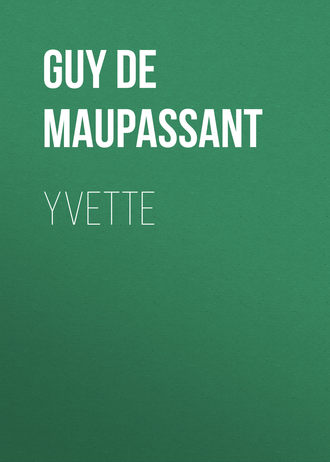
Ги де Мопассан
Yvette
In speaking to Yvette, Servigny never used the word "Mademoiselle," by reason of his close and long intimacy with her.
Then Saval asked: "Why does Mademoiselle always call my friend Servigny 'Muscade'?"
Yvette assumed a very frank air and said:
"I will tell you: It is because he always slips through my hands. Now I think I have him, and then I find I have not."
The Marquise, with her eyes upon Saval, arid evidently preoccupied, said in a careless tone: "You children are very funny."
But Yvette bridled up: "I do not intend to be funny; I am simply frank. Muscade pleases me, and is always deserting me, and that is what annoys me."
Servigny bowed profoundly, saying: "I will never leave you any more, Mam'zelle, neither day nor night." She made a gesture of horror:
"My goodness! no – what do you mean? You are all right during the day, but at night you might embarrass me."
With an air of impertinence he asked: "And why?"
Yvette responded calmly and audaciously, "Because you would not look well en deshabille."
The Marquise, without appearing at all disturbed, said: "What extraordinary subjects for conversation. One would think that you were not at all ignorant of such things."
And Servigny jokingly added: "That is also my opinion, Marquise."
Yvette turned her eyes upon him, and in a haughty, yet wounded, tone said: "You are becoming very vulgar – just as you have been several times lately." And turning quickly she appealed to an individual standing by:
"Chevalier, come and defend me from insult."
A thin, brown man, with an easy carriage, came forward.
"Who is the culprit?" said he, with a constrained smile.
Yvette pointed out Servigny with a nod of her head:
"There he is, but I like him better than I do you, because he is less of a bore."
The Chevalier Valreali bowed:
"I do what I can, Mademoiselle. I may have less ability, but not less devotion."
A gentleman came forward, tall and stout, with gray whiskers, saying in loud tones: "Mademoiselle Yvette, I am your most devoted slave."
Yvette cried: "Ah, Monsieur de Belvigne." Then turning toward Saval, she introduced him.
"My last adorer – big, fat, rich, and stupid. Those are the kind I like. A veritable drum-major – but of the table d'hote. But see, you are still bigger than he. How shall I nickname you? Good! I have it. I shall call you 'M. Colossus of Rhodes, Junior,' from the Colossus who certainly was your father. But you two ought to have very interesting things to say to each other up there, above the heads of us all – so, by-bye."
And she left them quickly, going to the orchestra to make the musicians strike up a quadrille.
Madame Obardi seemed preoccupied. In a soft voice she said to Servigny:
"You are always teasing her. You will warp her character and bring out many bad traits."
Servigny replies: "Why, haven't you finished her education?"
She appeared not to understand, and continued talking in a friendly way. But she noticed a solemn looking man, wearing a perfect constellation of crosses and orders, standing near her, and she ran to him:
"Ah Prince, Prince, what good fortune!"
Servigny took Saval's arm and drew him away:
"That is the latest serious suitor, Prince Kravalow. Isn't she superb?"
"To my mind they are both superb. The mother would suffice for me perfectly," answered Saval.
Servigny nodded and said: "At your disposal, my dear boy."
The dancers elbowed them aside, as they were forming for a quadrille.
"Now let us go and see the sharpers," said Servigny. And they entered the gambling-room.
Around each table stood a group of men, looking on. There was very little conversation. At times the clink of gold coins, tossed upon the green cloth or hastily seized, added its sound to the murmur of the players, just as if the money was putting in its word among the human voices.
All the men were decorated with various orders, and odd ribbons, and they all wore the same severe expression, with different countenances. The especially distinguishing feature was the beard.
The stiff American with his horseshoe, the haughty Englishman with his fan-beard open on his breast, the Spaniard with his black fleece reaching to the eyes, the Roman with that huge mustache which Italy copied from Victor Emmanuel, the Austrian with his whiskers and shaved chin, a Russian general whose lip seemed armed with two twisted lances, and a Frenchman with a dainty mustache, displayed the fancies of all the barbers in the world.
"You won't join the game?" asked Servigny.
"No, shall you?"
"Not now. If you are ready to go, we will come back some quieter day. There are too many people here to-day, and we can't do anything."
"Well, let us go."
And they disappeared behind a door-curtain into the hall. As soon as they were in the street Servigny asked: "Well, what do you think of it?"
"It certainly is interesting, but I fancy the women's side of it more than the men's."
"Indeed! Those women are the best of the tribe for us. Don't you find that you breathe the odor of love among them, just as you scent the perfumes at a hairdresser's?"
"Really such houses are the place for one to go. And what experts, my dear fellow! What artists! Have you ever eaten bakers' cakes? They look well, but they amount to nothing. The man who bakes them only knows how to make bread. Well! the love of a woman in ordinary society always reminds me of these bake-shop trifles, while the love you find at houses like the Marquise Obardi's, don't you see, is the real sweetmeat. Oh! they know how to make cakes, these charming pastry-cooks. Only you pay five sous, at their shops, for what costs two sous elsewhere."
"Who is the master of the house just now?" asked Saval.
Servigny shrugged his shoulders, signifying his ignorance.
"I don't know, the latest one known was an English peer, but he left three months ago. At present she must live off the common herd, or the gambling, perhaps, and on the gamblers, for she has her caprices. But tell me, it is understood that we dine with her on Saturday at Bougival, is it not? People are more free in the country, and I shall succeed in finding out what ideas Yvette has in her head!"
"I should like nothing better," replied Saval. "I have nothing to do that day."
Passing down through the Champs-Elysees, under the steps they disturbed a couple making love on one of the benches, and Servigny muttered: "What foolishness and what a serious matter at the same time! How commonplace and amusing love is, always the same and always different! And the beggar who gives his sweetheart twenty sous gets as much return as I would for ten thousand francs from some Obardi, no younger and no less stupid perhaps than this nondescript. What nonsense!"
He said nothing for a few minutes; then he began again: "All the same, it would be good to become Yvette's first lover. Oh! for that I would give – "
He did not add what he would give, and Saval said good night to him as they reached the corner of the Rue Royale.
CHAPTER II
BOUGIVAL AND LOVE
They had set the table on the veranda which overlooked the river. The Printemps villa, leased by the Marquise Obardi, was halfway up this hill, just at the corner of the Seine, which turned before the garden wall, flowing toward Marly.
Opposite the residence, the island of Croissy formed a horizon of tall trees, a mass of verdure, and they could see a long stretch of the big river as far as the floating cafe of La Grenouillere hidden beneath the foliage.
The evening fell, one of those calm evenings at the waterside, full of color yet soft, one of those peaceful evenings which produces a sensation of pleasure. No breath of air stirred the branches, no shiver of wind ruffled the smooth clear surface of the Seine. It was not too warm, it was mild – good weather to live in. The grateful coolness of the banks of the Seine rose toward a serene sky.
The sun disappeared behind the trees to shine on other lands, and one seemed to absorb the serenity of the already sleeping earth, to inhale, in the peace of space, the life of the infinite.
As they left the drawing-room to seat themselves at the table everyone was joyous. A softened gaiety filled their hearts, they felt that it would be so delightful to dine there in the country, with that great river and that twilight for a setting, breathing that pure and fragrant air.
The Marquise had taken Saval's arm, and Yvette, Servigny's. The four were alone by themselves. The two women seemed entirely different persons from what they were at Paris, especially Yvette. She talked but little, and seemed languid and grave.
Saval, hardly recognizing her in this frame of mind, asked her: "What is the matter, Mademoiselle? I find you changed since last week. You have become quite a serious person."
"It is the country that does that for me," she replied. "I am not the same, I feel queer; besides I am never two days alike. To-day I have the air of a mad woman, and to-morrow shall be as grave as an elegy. I change with the weather, I don't know why. You see, I am capable of anything, according to the moment. There are days when I would like to kill people, – not animals, I would never kill animals, – but people, yes, and other days when I weep at a mere thing. A lot of different ideas pass through my head. It depends, too, a good deal on how I get up. Every morning, on waking, I can tell just what I shall be in the evening. Perhaps it is our dreams that settle it for us, and it depends on the book I have just read."
She was clad in a white flannel suit which delicately enveloped her in the floating softness of the material. Her bodice, with full folds, suggested, without displaying and without restraining, her free chest, which was firm and already ripe. And her superb neck emerged from a froth of soft lace, bending with gentle movements, fairer than her gown, a pilaster of flesh, bearing the heavy mass of her golden hair.
Servigny looked at her for a long time: "You are adorable this evening, Mam'zelle," said he, "I wish I could always see you like this."
"Don't make a declaration, Muscade. I should take it seriously, and that might cost you dear."
The Marquise seemed happy, very happy. All in black, richly dressed in a plain gown which showed her strong, full lines, a bit of red at the bodice, a cincture of red carnations falling from her waist like a chain, and fastened at the hips, and a red rose in her dark hair, she carried in all her person something fervid, – in that simple costume, in those flowers which seemed to bleed, in her look, in her slow speech, in her peculiar gestures.
Saval, too, appeared serious and absorbed. From time to time he stroked his pointed beard, trimmed in the fashion of Henri III., and seemed to be meditating on the most profound subjects.
Nobody spoke for several minutes. Then as they were serving the trout, Servigny remarked:
"Silence is a good thing, at times. People are often nearer to each other when they are keeping still than when they are talking. Isn't that so, Marquise?"
She turned a little toward him and answered:
"It is quite true. It is so sweet to think together about agreeable things."
She raised her warm glance toward Saval, and they continued for some seconds looking into each other's eyes. A slight, almost inaudible movement took place beneath the table.
Servigny resumed: "Mam'zelle Yvette, you will make me believe that you are in love if you keep on being as good as that. Now, with whom could you be in love? Let us think together, if you will; I put aside the army of vulgar sighers. I'll only take the principal ones. Is it Prince Kravalow?"
At this name Yvette awoke: "My poor Muscade, can you think of such a thing? Why, the Prince has the air of a Russian in a wax-figure museum, who has won medals in a hairdressing competition."
"Good! We'll drop the Prince. But you have noticed the Viscount Pierre de Belvigne?"
This time she began to laugh, and asked: "Can you imagine me hanging to the neck of 'Raisine'?" She nicknamed him according to the day, Raisine, Malvoisie, [Footnote: Preserved grapes and pears, malmsey, – a poor wine.] Argenteuil, for she gave everybody nicknames. And she would murmur to his face: "My dear little Pierre," or "My divine Pedro, darling Pierrot, give your bow-wow's head to your dear little girl, who wants to kiss it."
"Scratch out number two. There still remains the Chevalier Valreali whom the Marquise seems to favor," continued Servigny.
Yvette regained all her gaiety: "'Teardrop'? Why he weeps like a Magdalene. He goes to all the first-class funerals. I imagine myself dead every time he looks at me."
"That settles the third. So the lightning will strike Baron Saval, here."
"Monsieur the Colossus of Rhodes, Junior? No. He is too strong. It would seem to me as if I were in love with the triumphal arch of L'Etoile."
"Then Mam'zelle, it is beyond doubt that you are in love with me, for I am the only one of your adorers of whom we have not yet spoken. I left myself for the last through modesty and through discretion. It remains for me to thank you."
She replied with happy grace: "In love with you, Muscade? Ah! no. I like you, but I don't love you. Wait – I – I don't want to discourage you. I don't love you – yet. You have a chance – perhaps. Persevere, Muscade, be devoted, ardent, submissive, full of little attentions and considerations, docile to my slightest caprices, ready for anything to please me, and we shall see – later."
"But, Mam'zelle, I would rather furnish all you demand afterward than beforehand, if it be the same to you."
She asked with an artless air: "After what, Muscade?"
"After you have shown me that you love me, by Jove!"
"Well, act as if I loved you, and believe it, if you wish."
"But you – "
"Be quiet, Muscade; enough on the subject."
The sun had sunk behind the island, but the whole sky still flamed like a fire, and the peaceful water of the river seemed changed to blood. The reflections from the horizon reddened houses, objects, and persons. The scarlet rose in the Marquise's hair had the appearance of a splash of purple fallen from the clouds upon her head.
As Yvette looked on from her end, the Marquise rested, as if by carelessness, her bare hand upon Saval's hand; but the young girl made a motion and the Marquise withdrew her hand with a quick gesture, pretending to readjust something in the folds of her corsage.
Servigny, who was looking at them, said:
"If you like, Mam'zelle, we will take a walk on the island after dinner."
"Oh, yes! That will be delightful. We will go all alone, won't we, Muscade?"
"Yes, all alone, Mam'zelle!"
The vast silence of the horizon, the sleepy tranquillity of the evening captured heart, body, and voice. There are peaceful, chosen hours when it becomes almost impossible to talk.
The servants waited on them noiselessly. The firmamental conflagration faded away, and the soft night spread its shadows over the earth.
"Are you going to stay long in this place?" asked Saval.
And the Marquise answered, dwelling on each word: "Yes, as long as I am happy."
As it was too dark to see, lamps were brought. They cast upon the table a strange, pale gleam beneath the great obscurity of space; and very soon a shower of gnats fell upon the tablecloth – the tiny gnats which immolate themselves by passing over the glass chimneys, and, with wings and legs scorched, powder the table linen, dishes, and cups with a kind of gray and hopping dust.
They swallowed them in the wine, they ate them in the sauces, they saw them moving on the bread, and had their faces and hands tickled by the countless swarm of these tiny insects. They were continually compelled to throw away the beverages, to cover the plates, and while eating to shield the food with infinite precautions.
It amused Yvette. Servigny took care to shelter what she bore to her mouth, to guard her glass, to hold his handkerchief stretched out over her head like a roof. But the Marquise, disgusted, became nervous, and the end of the dinner came quickly. Yvette, who had not forgotten Servigny's proposition, said to him:
"Now we'll go to the island."
Her mother cautioned her in a languid tone: "Don't be late, above all things. We will escort you to the ferry."
And they started in couples, the young girl and her admirer walking in front, on the road to the shore. They heard, behind them, the Marquise and Saval speaking very rapidly in low tones. All was dark, with a thick, inky darkness. But the sky swarmed with grains of fire, and seemed to sow them in the river, for the black water was flecked with stars.
The frogs were croaking monotonously upon the bank, and numerous nightingales were uttering their low, sweet song in the calm and peaceful air.
Yvette suddenly said: "Gracious! They are not walking behind us any more, where are they?" And she called out: "Mamma!" No voice replied. The young girl resumed: "At any rate, they can't be far away, for I heard them just now."
Servigny murmured: "They must have gone back. Your mother was cold, perhaps." And he drew her along.
Before them a light gleamed. It was the tavern of Martinet, restaurant-keeper and fisherman. At their call a man came out of the house, and they got into a large boat which was moored among the weeds of the shore.
The ferryman took his oars, and the unwieldy barge, as it advanced, disturbed the sleeping stars upon the water and set them into a mad dance, which gradually calmed down after they had passed. They touched the other shore and disembarked beneath the great trees. A cool freshness of damp earth permeated the air under the lofty and clustered branches, where there seemed to be as many nightingales as there were leaves. A distant piano began to play a popular waltz.
Servigny took Yvette's arm and very gently slipped his hand around her waist and gave her a slight hug.
"What are you thinking about?" he said.
"I? About nothing at all. I am very happy!"
"Then you don't love me?"
"Oh, yes, Muscade, I love you, I love you a great deal; only leave me alone. It is too beautiful here to listen to your nonsense."
He drew her toward him, although she tried, by little pushes, to extricate herself, and through her soft flannel gown he felt the warmth of her flesh. He stammered:
"Yvette!"
"Well, what?"
"I do love you!"
"But you are not in earnest, Muscade."
"Oh, yes I am. I have loved you for a long time."
She continually kept trying to separate herself from him, trying to release the arm crushed between their bodies. They walked with difficulty, trammeled by this bond and by these movements, and went zigzagging along like drunken folk.
He knew not what to say to her, feeling that he could not talk to a young girl as he would to a woman. He was perplexed, thinking what he ought to do, wondering if she consented or did not understand, and curbing his spirit to find just the right, tender, and decisive words. He kept saying every second:
"Yvette! Speak! Yvette!"
Then, suddenly, risking all, he kissed her on the cheek. She gave a little start aside, and said with a vexed air:
"Oh! you are absurd. Are you going to let me alone?"
The tone of her voice did not at all reveal her thoughts nor her wishes; and, not seeing her too angry, he applied his lips to the beginning of her neck, just beneath the golden hair, that charming spot which he had so often coveted.
Then she made great efforts to free herself. But he held her strongly, and placing his other hand on her shoulder, he compelled her to turn her head toward him and gave her a fond, passionate kiss, squarely on the mouth.
She slipped from his arms by a quick undulation of the body, and, free from his grasp, she disappeared into the darkness with a great swishing of skirts, like the whir of a bird as it flies away.
He stood motionless a moment, surprised by her suppleness and her disappearance, then hearing nothing, he called gently: "Yvette!"
She did not reply. He began to walk forward, peering through the shadows, looking in the underbrush for the white spot her dress should make. All was dark. He cried out more loudly:
"Mam'zelle Yvette! Mam'zelle Yvette!"
Nothing stirred. He stopped and listened. The whole island was still; there was scarcely a rustle of leaves over his head. The frogs alone continued their deep croakings on the shores. Then he wandered from thicket to thicket, going where the banks were steep and bushy and returning to places where they were flat and bare as a dead man's arm. He proceeded until he was opposite Bougival and reached the establishment of La Grenouillere, groping the clumps of trees, calling out continually:
"Mam'zelle Yvette, where are you? Answer. It is ridiculous! Come, answer! Don't keep me hunting like this."
A distant clock began to strike. He counted the hours: twelve. He had been searching through the island for two hours. Then he thought that perhaps she had gone home; and he went back very anxiously, this time by way of the bridge. A servant dozing on a chair was waiting in the hall.
Servigny awakened him and asked: "Is it long since Mademoiselle Yvette came home? I left her at the foot of the place because I had a call to make."
And the valet replied: "Oh! yes, Monsieur, Mademoiselle came in before ten o'clock."
He proceeded to his room and went to bed. But he could not close his eyes. That stolen kiss had stirred him to the soul. He kept wondering what she thought and what she knew. How pretty and attractive she was!
His desires, somewhat wearied by the life he led, by all his procession of sweethearts, by all his explorations in the kingdom of love, awoke before this singular child, so fresh, irritating, and inexplicable. He heard one o'clock strike, then two. He could not sleep at all. He was warm, he felt his heart beat and his temples throb, and he rose to open the window. A breath of fresh air came in, which he inhaled deeply. The thick darkness was silent, black, motionless. But suddenly he perceived before him, in the shadows of the garden, a shining point; it seemed a little red coal.
"Well, a cigar!" he said to himself. "It must be Saval," and he called softly: "Leon!"
"Is it you, Jean?"
"Yes. Wait. I'll come down." He dressed, went out, and rejoining his friend who was smoking astride an iron chair, inquired: "What are you doing here at this hour?"
"I am resting," Saval replied. And he began to laugh. Servigny pressed his hand: "My compliments, my dear fellow. And as for me, I – am making a fool of myself."
"You mean – "
"I mean that – Yvette and her mother do not resemble each other."
"What has happened? Tell me."
Servigny recounted his attempts and their failure. Then he resumed:
"Decidedly, that little girl worries me. Fancy my not being able to sleep! What a queer thing a girl is! She appears to be as simple as anything, and yet you know nothing about her. A woman who has lived and loved, who knows life, can be quickly understood. But when it comes to a young virgin, on the contrary, no one can guess anything about her. At heart I begin to think that she is making sport of me."
Saval tilted his chair. He said, very slowly: "Take care, my dear fellow, she will lead you to marriage. Remember those other illustrious examples. It was just by this same process that Mademoiselle de Montijo, who was at least of good family, became empress. Don't play Napoleon."
Servigny murmured: "As for that, fear nothing. I am neither a simpleton nor an emperor. A man must be either one or the other to make such a move as that. But tell me, are you sleepy?"
"Not a bit."
"Will you take a walk along the river?"
"Gladly."
They opened the iron gate and began to walk along the river bank toward Marly. It was the quiet hour which precedes dawn, the hour of deep sleep, of complete rest, of profound peacefulness. Even the gentle sounds of the night were hushed. The nightingales sang no longer; the frogs had finished their hubbub; some kind of an animal only, probably a bird, was making somewhere a kind of sawing sound, feeble, monotonous, and regular as a machine. Servigny, who had moments of poetry, and of philosophy too, suddenly remarked: "Now this girl completely puzzles me. In arithmetic, one and one make two. In love one and one ought to make one but they make two just the same. Have you ever felt that? That need of absorbing a woman in yourself or disappearing in her? I am not speaking of the animal embrace, but of that moral and mental eagerness to be but one with a being, to open to her all one's heart and soul, and to fathom her thoughts to the depths."
"And yet you can never lay bare all the fluctuations of her wishes, desires, and opinions. You can never guess, even slightly, all the unknown currents, all the mystery of a soul that seems so near, a soul hidden behind two eyes that look at you, clear as water, transparent as if there were nothing beneath a soul which talks to you by a beloved mouth, which seems your very own, so greatly do you desire it; a soul which throws you by words its thoughts, one by one, and which, nevertheless, remains further away from you than those stars are from each other, and more impenetrable. Isn't it queer, all that?"







